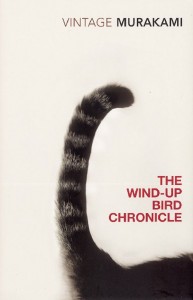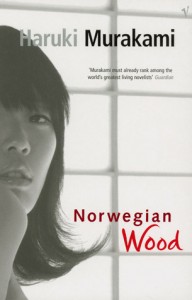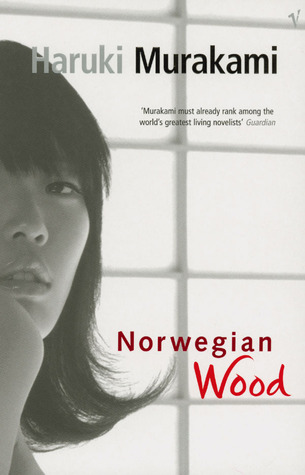by Vani Viswanathan
[box]What’s a story without happy beginnings and happy endings? A lot, argues Vani Viswanathan, using Japanese author Haruki Murakami as an example.[/box]We all like a happy story. A happy beginning (it can be unhappy too, we don’t mind that much), a series of trials and tribulations, but a happy ending. We are also particular about the ending being there. If you don’t believe me, remember the last movie that didn’t take this route (say, Dhobi Ghaat), or a book you read that didn’t have an ending. There, am I not correct? Something seems strangely unfinished, bereft, in a story without a happy ending, and without an ending, oh God, really, now!
Personally, though, I have loved stories without an ending, or if the story closes with a less-than-happy scenario. There is something beautiful about them – the story has more legs to it than the author has currently chosen to indulge in, and our mind is free to think of the futures of the characters; maybe there is some hope for a happier ending to the story than we think, or maybe the ending is worse and the author decided to spare us from the agony of it.
 One author who perhaps exploits this brilliantly, according to me, is Haruki Murakami. I have only read his English translations, but they are just so lucid and beautiful that you have no choice but to fall in love with Murakami’s style of expression, turn of phrases and how can I forget, the sheer weirdness that is so characteristic of his human creations!
One author who perhaps exploits this brilliantly, according to me, is Haruki Murakami. I have only read his English translations, but they are just so lucid and beautiful that you have no choice but to fall in love with Murakami’s style of expression, turn of phrases and how can I forget, the sheer weirdness that is so characteristic of his human creations!
Although I have not read even half of all of Murakami’s works, I can testify to the extent of peculiarities that is quintessentiall
 The first book I read of his was ‘The Wind-up Bird Chronicle,’ a story of – gosh, it’s so hard to even put it into a line, but I’ll try – a man who loses his job, his cat and his wife all in a short span of time, and goes on a journey of one bizarre occurrence after another, involving a sister duo, a sensuous woman on the phone, an odd teenager, a fortune-teller, his friend, a mother-and-son team who run an incomprehensible business, and a well. Toru feels lost, but finds solace in his quirky neighbour May Kasahara, a teenager who keeps talking about death, and the fortune-teller’s friend – a lieutenant – who tells him of a deeply chilling experience during the Second Sino-Japanese War – a description so gripping and poignant that for a couple of hours after reading this, I kept reliving the terrifying story and words in my mind. Toru also meets a mother and son, who go by the name Nutmeg and Cinnamon, and have a weird, occultist duty for him. Perhaps the most significant turn in the novel comes when Toru decides to isolate himself in the depths of a well, where – in a sequence that might be real or unreal – he mysteriously walks through the wall to go into a hotel room. Innumerable stories intersect the plot, and Toru gets to hear about the lives of people he has never met and will never meet, through people he didn’t know a few weeks back. The plot is an intricate maze with so many doors, but you don’t get to see what’s inside all of them. And in a typical Murakami fashion, a number of the eccentric strings are left untied, and you are left with a story that ends before you comprehend the bizarreness of it all. All you know is you enjoyed the journey thoroughly.
The first book I read of his was ‘The Wind-up Bird Chronicle,’ a story of – gosh, it’s so hard to even put it into a line, but I’ll try – a man who loses his job, his cat and his wife all in a short span of time, and goes on a journey of one bizarre occurrence after another, involving a sister duo, a sensuous woman on the phone, an odd teenager, a fortune-teller, his friend, a mother-and-son team who run an incomprehensible business, and a well. Toru feels lost, but finds solace in his quirky neighbour May Kasahara, a teenager who keeps talking about death, and the fortune-teller’s friend – a lieutenant – who tells him of a deeply chilling experience during the Second Sino-Japanese War – a description so gripping and poignant that for a couple of hours after reading this, I kept reliving the terrifying story and words in my mind. Toru also meets a mother and son, who go by the name Nutmeg and Cinnamon, and have a weird, occultist duty for him. Perhaps the most significant turn in the novel comes when Toru decides to isolate himself in the depths of a well, where – in a sequence that might be real or unreal – he mysteriously walks through the wall to go into a hotel room. Innumerable stories intersect the plot, and Toru gets to hear about the lives of people he has never met and will never meet, through people he didn’t know a few weeks back. The plot is an intricate maze with so many doors, but you don’t get to see what’s inside all of them. And in a typical Murakami fashion, a number of the eccentric strings are left untied, and you are left with a story that ends before you comprehend the bizarreness of it all. All you know is you enjoyed the journey thoroughly.
 ‘Norwegian Wood’ is a similarly brilliant, equally peculiar tale revolving around Toru, Naoko and Midori. Toru and Naoko are drawn to each other, but they share a troubling history: Toru’s best friend and Naoko’s boyfriend Kizuki killed himself when he was 17. Toru and Naoko meet when they move to Tokyo for college, and just when you think something might work out between them, Murakami seems to come in with a ‘Not so fast!’ – Naoko leaves Tokyo to spend some time in an asylum amidst far away hills without informing Toru till a few months later. When Toru visits her, he also meets and gets to know the unnerving past of her roommate, Reiko. ‘Norwegian Wood’ is Naoko’s favourite song, and Reiko, a brilliant singer, performs it for her often. In Tokyo, in the meantime, Toru also becomes close to Midori, a girl eccentric in her own right – she lies that her father is in Uruguay while he is in Tokyo, succumbing to brain cancer. Vintage Murakami is in action with his unusual characters again: there is the cleanliness freak ‘Storm Trooper,’ who is Toru’s roommate in the dorm; Toru is good friends with diplomacy student Nagasawa and his girlfriend Hatsumi who puts up with Nagasawa’s blatant cheating. I recently got to know that this novel developed from a short story that Murakami had written, titled ‘Firefly’ – in the book, this forms among the early chapters – where he explores, using a firefly, the elusiveness of so much in life.
‘Norwegian Wood’ is a similarly brilliant, equally peculiar tale revolving around Toru, Naoko and Midori. Toru and Naoko are drawn to each other, but they share a troubling history: Toru’s best friend and Naoko’s boyfriend Kizuki killed himself when he was 17. Toru and Naoko meet when they move to Tokyo for college, and just when you think something might work out between them, Murakami seems to come in with a ‘Not so fast!’ – Naoko leaves Tokyo to spend some time in an asylum amidst far away hills without informing Toru till a few months later. When Toru visits her, he also meets and gets to know the unnerving past of her roommate, Reiko. ‘Norwegian Wood’ is Naoko’s favourite song, and Reiko, a brilliant singer, performs it for her often. In Tokyo, in the meantime, Toru also becomes close to Midori, a girl eccentric in her own right – she lies that her father is in Uruguay while he is in Tokyo, succumbing to brain cancer. Vintage Murakami is in action with his unusual characters again: there is the cleanliness freak ‘Storm Trooper,’ who is Toru’s roommate in the dorm; Toru is good friends with diplomacy student Nagasawa and his girlfriend Hatsumi who puts up with Nagasawa’s blatant cheating. I recently got to know that this novel developed from a short story that Murakami had written, titled ‘Firefly’ – in the book, this forms among the early chapters – where he explores, using a firefly, the elusiveness of so much in life.
What delighted me most, though, was his collection of short stories, ‘Blind Willow, Sleeping Woman,’ a book full of eccentric, lost, wildly imaginative people, with equally unbelievable stories. Which ones do I pick for you? Maybe the story of the man in ‘Nausea 1979,’ the man with a taste for jazz and his friends’ wives, who vomited once a day for 40 days, during which period he also had a mysterious someone call him everyday. Or ‘Man Eating Cats’, set in Greece, where after narrating to his partner a news story on an old woman who dies and is eaten by her starving cats eventually, a man discovers he is a puppet, and the real he has been eaten by cats. Or better still, the repulsive story ‘Crabs’ where a man eats too much tasty crab in Singapore and throws up a few days later, and finds the meat in his vomit moving (even typing this makes me shiver in disgust!). There is also the surreal ‘A “Poor Aunt” Story,’ where a writer who wants to write about a poor aunt suddenly finds one suddenly hanging around on his back, wherever he goes, whatever he does. There is also the strangely sad and poignant ‘Tony Takitani,’ where a brilliant illustrator loses his wife whom he loved too much, and he is left with an endless wardrobe of dresses and jackets that she loved beyond anything else in the world.
These stories, as are his novels, are sheer magic; they are complex, intricate webs that you get lost in, so much so that when they end, you don’t realise it. You have only been enthralled by the pure absurdity and abnormality of it all; or maybe the entrenched sadness, incompleteness that most of the characters face most of their lives. Yes, there are tropes, and with time you come to simply expect weirdness as a constant part of his tales, but where they come from will still surprise you; the starkness of the thoughts and the language will floor you. Murakami is worth all the effort you need to put into reading him!
Vani Viswanathan is often lost in her world of books and A R Rahman, churning out lines in her head or humming a song. Her world is one of frivolity, optimism, quietude and general chilled-ness, where there is always place for outbursts of laughter, bouts of silence, chocolate, ice cream and lots of books and endless iTunes playlists from all over the world. Vani was a Public Relations consultant in Singapore and decided enough is enough with the struggle to find veggie food everyday, and returned to India after seven long years away. Vani blogs at http://chennaigalwrites.blogspot.com
[box type=”download”] If you have trouble opening the PDF, please right click on the button and select ‘Save Link As/Save Target As’. This will help save the PDF to your computer. If you still have trouble, drop us a mail at editors@sparkthemagazine.com and we will mail you the PDF straight to your inbox! DON’T MISS THE PDF EXPERIENCE![/box] [button link=”http://www.sparkthemagazine.com/wp-content/uploads/2012/02/spark-feb-2012.pdf” newwindow=”yes”] Click here to download the Feb 2012 issue as a PDF![/button] [button link=”http://issuu.com/sparkeditor/docs/spark-feb-2012?mode=embed&layout=http%3A%2F%2Fskin.issuu.com%2Fv%2Fcolor%2Flayout.xml&backgroundColor=000000&showFlipBtn=true” color=”green” newwindow=”yes”] Click here to flip and read the issue like a magazine![/button]
[facebook]Share[/facebook] [retweet]Tweet[/retweet]








I love Norwegian Wood. Finally someone who loves Murakami as much as I do! 🙂
I’ve never read Murakami. And someday when I do pick it up, thanks to you, I know I will fall in love with it 🙂
Lovely piece.